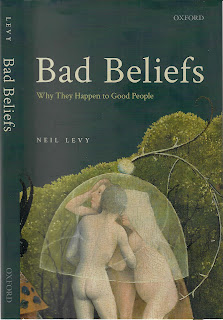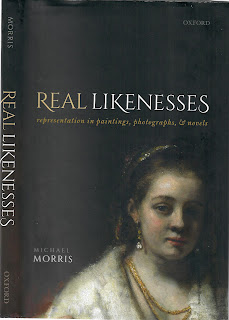This is a very
interesting, very readable book not least because the author, though presenting
himself as a professional philosopher, draws on a range of theories and data
culled from contemporary cognitive and behavioural sciences. His leading idea
is that we live in an epistemic [knowledge]
environment which is now heavily polluted by poor research, fake news,
conspiracy theories, and so on, but where understandable concerns about free
speech and poorly thought through notions of “balance” have so far prevented
any serious clean up. This is important because self-help strategies alone
cannot rescue individuals from forming false beliefs and making unfounded
claims to knowledge. Indeed, it is the very fact that we are rational animals
deploying our efforts in scarce real time that often enough leads us to false
beliefs. We are reliant on those around us and society’s institutions for our
sense of what is true and what is false and they ain’t making it easy. Reform
is needed.
These problems are not
as contemporary as Levy presents them; there is a long back story of concern
about the power of charlatans, demagogues, and revolutionaries to lead even the
thoughtful astray. That concern, in a recognisably modern form, dates at least
from the eighteenth century. For example, when the charlatan Anton Mesmer
started to make a big hit in pre-1789 France, the leaders of institutionalised
French science and philosophy sought to articulate ways in which an ordinary
non-expert person might see that he was a charlatan even without detailed
understanding of his theories, such as they were[1]. True, in retrospect Mesmer clearly had some
prescient understanding of aspects of the human mind which were then little
understood. But this was incidental: Mesmer was running a (literal) theatre for
the sake of fame and money. Something similar might be said of Jacques Lacan in
the latter part of his life[2].
It would be easy to
suppose that the institutional leaders were only concerned to keep outsiders
outside but, as it happens, the most intellectually powerful figure among them
- the Marquis de Condorcet - was not only a democrat who believed in a wide
franchise (which would include women) but was responsible for a 1785 work in
the theory of probabilities which showed that there is, as far as knowledge is
concerned, strength in numbers: if certain conditions are met, it is rational
to defer to majority opinion because the majority is more likely to be right
than wrong and the bigger the absolute gap between majority and minority, the
greater the reliability. Condorcet and his followers took juries as a prime location for application of
his probability work for it leads to the
conclusion that - conditions met -
larger juries are better than smaller ones and a requirement of
unanimity or near unanimity much, much better than simple majority vote. What
Condorcet could not anticipate was the TV programme Who Wants to Be A Millionaire which demonstrates the truth of his
claims in near-perfect form.
Condorcet showed that majority voting is a good guide to
truth:
(1) the more enlightened (knowledgeable) is each
individual voter, with a minimum requirement that they be more likely to be
right than wrong on any one occasion (p = greater than 0.5)
(2) provided that when voting, voters are trying
to give the right answer
(3) and provided that they vote independently of
each other - if one voter follows the lead of another, that simply reduces the
effective number of voters
If these conditions are met, then in a majority
vote the probability of the majority being right increases (and quite
dramatically, heading towards p = 1 [certainty] ) the larger the absolute vote
gap between majority and minority.
In the TV quiz show Who Wants to be a Millionaire? contestants have the right to ask the large audience for help
with a question to which they don’t know the answer. Audience members are then
offered four possible answers to the question and asked to select the right
answer from among them. It’s rational for the contestant to confirm the
audience’s majority answer as their own - and for these reasons:
(1) the Audience is likely to be quite
knowledgeable. Quiz show live audiences are likely to contain a high proportion
of people good at quizzes, so p is likely to be greater than 0.5.
(2) members of the audience have no motive to give
answers they believe to be untrue (they enjoy
giving right answers!)
(3) they vote independently of each other using
push-button consoles with little or no time to consult the person sitting next
to them and explicit instructions not to.
Hey Presto, the audience's choice of right answer
will, almost certainly, BE the right answer. If some researcher checked back
over Ask the Audience choices, I
think they would rarely find that the Audience got it wrong. Ask the Audience
is a No Brainer if you don't know the answer yourself[3].
In nineteenth century England, progressive thinkers who
wanted to see a more democratic society with a wider franchise always met with
objections which insisted that the masses were too ignorant and too liable to
be seduced by charlatans for it to be safe to entrust them with the vote. To
this, progressive thinkers - most obviously the Utilitarians - responded with
proposals for extending education to all, but also with a defence of the
desirability of deference to scientific authority. Deference is a key term in Levy’s book and his criteria for
identifying those people and theories worthy of deference map very closely onto
criteria proposed by Utilitarian thinkers. Thus Levy writes,
“A scientific consensus is reliable when it has been
stress-tested, by all the disciplines relevant to the topic, for an extended
period of time” (page 109)
Compare this passage from a book published in England in
1849:
“With respect to the subjects of speculation and science, the
existence of an agreement of the
persons having the above qualifications [natural ability, long study, personal
honesty] is the most important matter. If all the able and honest men who have
diligently studied the subject, or most of them, concur, and if this consent
extends over several successive generations, at an enlightened period, and in
all or most civilised countries, then the authority is at its greatest” (page
42) as it is in astronomy (page 43).
This passage is taken from An Essay on the Influence of Authority in Matters of Opinion by Sir
George Cornewall Lewis, usually reckoned a minor Utilitarian thinker. One of
his major themes is that when it comes to forming rational beliefs and opinions
we have to rely on others; we cannot do it alone. This is the theme to which
Levy devotes chapter 4 of his book, starting with a critique of the
individualism of traditional epistemology and its impossible reliance on a
chimera of “unaided individual cognition”. Sir George Cornewall Lewis provides
the basic argument against this view:
“I firmly believe…that the earth moves round the sun; though
I know not a tittle of the evidence from which the conclusion is inferred. And
my belief is perfectly rational, though it rests upon mere authority….” (page
63).
That’s the way it is: we rely on authority much more than we
imagine, we have to do so, and it is fully rational to do so IF the epistemic
environment is not degraded. Unlike Levy, Lewis simply asserts that the
environment is a healthy one for the passage I have just quoted continues:
“….all who have scrutinised the evidence concur in confirming
the fact; and have no conceivable motive to assert and diffuse the conclusion,
but the liberal and beneficent desire of maintaining and propagating truth” (p
63)[4]
Were that it was ever thus! A substantial part of Neil Levy’s book tells the depressing
story of the many ways in which it ain’t like that. I will not summarise the
various stories which extend well beyond the obvious ones: denying the
Holocaust, denying climate change, denying the efficacy of vaccines. Levy’s
central proposal is that we need to clean up the epistemic environment on which
we have to rely and he looks to nudge theory for inspiration, arguing in
chapter 6 (“Nudging Well”) that nudges can support our personal rationality and
autonomy, not manipulatively undermine them as is often enough alleged.
I can think of just one alternative that has ever been
proposed: Auguste Comte reckoned that the intellectual environment of his time
was pretty polluted; he thought the solution was to quarantine himself from
it. He called this “mental hygiene”. I am sure he would have recommended
disconnection from Facebook, Twitter, and much more besides.
[1] Robert Darnton, Mesmerism
and the End of the Enlightenment in France (1968)
[2] Trevor Pateman, https://www.academia.edu/43059186/Jacques_Lacan_in_the_text_of_Elisabeth_Geblesco
[3] Trevor Pateman,
https://www.academia.edu/43058086/Majoritarianism_An_argument_from_Rousseau_and_Condorcet
[4] https://www.academia.edu/43045987/Liberty_Authority_and_the_Negative_Dialectics_of_J_S_Mill
This paper, along with
that on Majoritarianism previously cited,
is based on my M Phil thesis How Is Political Knowledge Possible? (University
of Sussex, submitted 1977, awarded 1978)


